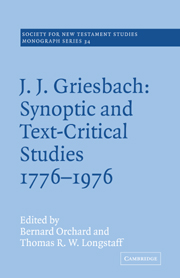Book contents
- Frontmatter
- Contents
- Portrait of J. J. Griesbach
- Copy of Colloquium announcement
- List of participants and selected observers
- Preface
- Abbreviations
- 1 The genesis of the Colloquium
- 2 Johann Jakob Griesbach: his life, work and times
- 3 The Gospel synopsis from 1776 to the present day
- 4 Griesbach's answer to the Synoptic Question
- 5 Commentatio qua Marci Evangelium totum e Matthaei et Lucae commentariis decerptum esse monstratur
- 6 A demonstration that Mark was written after Matthew and Luke
- 7 Griesbach and the development of text criticism
- 8 Modern text criticism and the Synoptic Problem
- 9 At the Colloquium's conclusion
- 10 The Griesbach Hypothesis: a bibliography
- Notes
- Appendix
- Index
9 - At the Colloquium's conclusion
Published online by Cambridge University Press: 23 December 2009
- Frontmatter
- Contents
- Portrait of J. J. Griesbach
- Copy of Colloquium announcement
- List of participants and selected observers
- Preface
- Abbreviations
- 1 The genesis of the Colloquium
- 2 Johann Jakob Griesbach: his life, work and times
- 3 The Gospel synopsis from 1776 to the present day
- 4 Griesbach's answer to the Synoptic Question
- 5 Commentatio qua Marci Evangelium totum e Matthaei et Lucae commentariis decerptum esse monstratur
- 6 A demonstration that Mark was written after Matthew and Luke
- 7 Griesbach and the development of text criticism
- 8 Modern text criticism and the Synoptic Problem
- 9 At the Colloquium's conclusion
- 10 The Griesbach Hypothesis: a bibliography
- Notes
- Appendix
- Index
Summary
It is, of course, impossible to provide in this brief essay a complete or comprehensive account of the Griesbach Bicentenary Colloquium. The papers prepared for circulation among the participants were all of very high quality and the discussion which they stimulated, while often intense and vigorous, was always considerate and productive. In this essay I can do no more than indicate a few of the more important topics raised for discussion together with some of the conclusions reached and suggestions made for further research.
In the first place, although the three areas of specialization chosen for emphasis were approached separately, the participants soon came to see that both in the work of Griesbach and in contemporary research the three areas are in fact very closely interrelated. In the second place, although the papers included in this volume (as has been explained in the editors’ preface) deal primarily with Griesbach's own work and the influence which it has had on continuing New Testament studies, the discussion itself knew no such limitation. Indeed, many exciting hours were spent by the participants (both in formal meetings and in casual conversations) considering the present state of research on the important questions involved in the three areas chosen for emphasis. An attempt was made to define the important questions which must henceforth be considered if further progress is to be made in those areas where Griesbach's interest and contribution were greatest. I will return to this point toward the end of this essay.
- Type
- Chapter
- Information
- J. J. Griesbach: Synoptic and Text - Critical Studies 1776–1976 , pp. 170 - 175Publisher: Cambridge University PressPrint publication year: 1979



